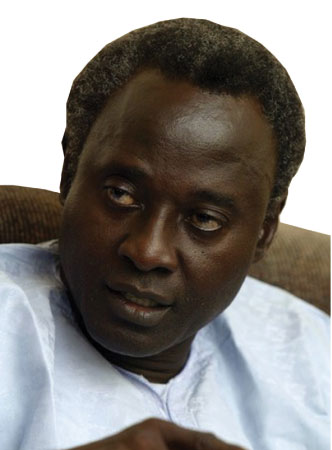
The Secretary General of the opposition Peoples Democratic Organisation for Independence and Socialism (PDOIS), who is also the spokesperson of the Group of Six opposition parties, has told The Point in an exclusive interview that change is inevitable in all republics where power is owned by the people.
“Parties will come and go, and leaders will come and go. What is important is the historical record they leave behind for posterity. That is what should be of concern to every political leader,” Halifa Sallah told The Point.
In Sallah’s view, after 42 years of Republican existence, many Gambians are yet to truly realise and show that sovereignty resides in them; that their vote is their power and voice to state and dictate who governs their country and how.
“They are the architects of their destiny, and should never fold their hands and appear helpless. Once they are aware, wise and honest enough to make informed choice they will be the architects of a destiny of liberty, dignity and prosperity,” he said.
On comments by one-time opposition strongman Lamin Waa Juwara that opposition parties are dead, Halifa responded that the future of political parties depends on the parties themselves, and that such opinions are not relevant in politics.
“Those that aim to defend the needs and aspirations of the people will survive, and those that cannot will disappear. However, the survival or disappearance of political parties does not legitimize a life presidency,” he stated.
According to Sallah, governance is not centrally a party issue even though parties could be incidental to it.
“Republican constitutions do not recognise party governments. They only recognise executive governments. The executive could stand on a party ticket or an Independent ticket. Once elected he or she could draw a cabinet from party members, form coalition governments from members of different parties like in
He added: “In fact, Juwara himself is recruited from outside the APRC. Hence, who is to be the next President of The Gambia has nothing to do with the survival or non survival of a political party.
“I would have thought that Lamin Juwara would have been promoting a two-term limit and would be advising President Jammeh that, since he would be in office for 22 years by the end of his term, he should now agree to constitutional reforms like Mugabe to introduce a two-term limit, and the second round of voting in the absence of 50 percent majority in the first round, and then announce that he would not seek another term, but would preside over genuine elections.
He noted that it is an exercise in futility to become a soothsayer who predicts when parties will disappear and leave the scene for the self-perpetuating rule of the APRC to prevail.
The lessons of the March 29th polls, he added, should have been instructive to Juwara and the APRC on what the future holds, noting that the facts reveal that the number of registered voters in The Gambia is 796,929.
“There are 48 constituencies in the country. 25 constituencies went uncontested. There are 308,489 registered voters in the 23 constituencies where elections were conducted, but only 154,950 persons voted. Out of those who voted in the 23 constituencies the APRC had only 80,289 votes which amounts to 51.82 percent and resulted in 18 contested seats.
“NRP contested in 8 seats and had 14,606 votes, which is translated into 9.43 percent and one elected seat. The Independent Candidates had 60,055 or 38.76 percent of the votes cast and four seats. If one combines the votes that were cast for candidates opposed to the APRC, they add up to little more than 74,000 votes. This is approximately 5000 votes less than the total votes attained by the APRC,” he explained.
Sallah noted that despite the threats issued by the President over the national TV and radio, the APRC had a marginal lead in the popular vote of less than 6000 votes.
“In Lower Fuladu West four candidates stood and the Independent candidate won,” he said, adding that this confirms that with a level ground for multi-party contest, the APRC would end up being a minority party.
In his view, Juwara should not focus on Sidia Jatta’s seat in Wuli or the opposition parties.
“In Niamina Dankunku Constituency from where he hailed, he could not help the APRC to win. Hence the facts do not reveal that the opposition is dying. It reveals that the APRC is losing popularity. He should not substitute facts with fiction.”

